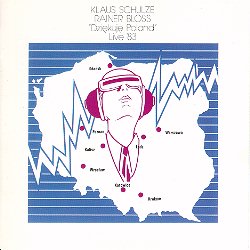| Discography |
 |
Reviews |
| »Im Frühsommer dieses Jahres besuchte Klaus Schulze bei seiner großen Europa-Tournee auch
die Volksrepublik Polen. Obwohl er dort bislang noch keine seiner LPs veröffentlichen durfte,
schlug ihm eine Welle der Begeisterung entgegen. Zu den neun Konzerten kamen über 80.000
Zuhörer, die auf Umwegen offenbar mit seinen Werken bestens vertraut waren. Die jetzt
vorliegende Do-LP ist eine einzigartige Dokumentation dieser außergewöhnlichen Konzerte. ... Das
ganze hat einen kristallklaren Sound, so tief und deutlich, daß man glaubt, ihn nicht nur zu hören,
sondern auch anfassen zu können.« ('83, "Govi Katalog", Germany) |
|||
| »Rock'n'roll music, jazz, and classical music all have one thing in common -- an inate ability to be
reproduced in a live concert with some degree of ease. Electronic music, on the other hand, is
difficult at best, a nightmare at worst, when it comes to a live concert. Everyone including Klaus
Schulze agreed after the 1980 live album that his electronic music was one of those nightmare
situations when it came to a live album.[?] With Dziekuje Poland Klaus Schulze proves us all
wrong. This is one of the finest albums of live electronic music that exists in the world today. The
production, the sound, the music are all perfect -- Schulze and Bloss have combined to create an
amazing collection of music from a live tour. The tour covers 8 cities in Poland during a 1983 tour,
which in itself is an incredible feat considering the state of the Polish government in 1983! The album title translates to "thank you, Poland" and is really a heartfelt thanks from not only the artists but from all of us who are able to listen to the music on vinyl. ... The entire album was digitally recorded... true state-of-the-art recording. There is no doubt as to Klaus Schulze's standing as one of the top electronic musicians in the world today... on this tour the sound achieves a new level of greatness. I have always had a soft spot for the pounding rhythms and vibrant melodies that Schulze produces and it's great to be able to capture those sounds in double live album. This collection is an absolute must for the serious collector and a good starting place for the novice -- my highest recommendations for this album!« (7/84, "Synthetic Pleasure", USA) |
|||
| »Klaus Schulze is a German synthesist who's been entrancing European audiences for over 14
years. ... Schulze was playing free-style drums with T. Dream, which not only accounts for his
rhythmic vitality, but why his music brings the turbulent vortex of John Coltrane to mind. They
both share modal forms as well as a relentless, overpowering rhythmic drive. Instead of the power
plant percussives of an Elvin Jones or Rashid Ali, Schulze has intricately-programmed drum
machines and sequencers. Of course, Schulze's classically-inclined compositions are more
structured and detailed than Coltrane's windstorms, but they have the same spiritual intensity
and far-reaching, often eastern concept of time and tonality. Schulze's are simply shaped by the
electronic and computer technology available. Schulze isn't a technical virtuoso like Coltrane. ... But he has the same gift for sound-shaping as Coltrane. He constantly interacts with his instruments, altering their sonic character, making solos vibrantly alive that would be monotonous if he were simply playing the notes on another instrument. That's why, with all his digital synthesizers, Schulze still uses the more spontaneous and intimate Mini-Moog when he wants to cut loose. This music is not on automatic pilot. Dziekuje Poland documents the carnival of sound that Schulze presented to stadiums full of Poles in 1983. In concert, Schulze plays freely with classically precise structures that are full of sonic corners and trap doors. One of those doors is a massive orchestral chord that sounds like it's been digitally sampled from BEETHOVEN's Ninth and synthetically magnified and altered. It's first heard as a rapture in space and time during a romantic piano prelude on Katowice, crashing in and sending the music off on a rollercoaster of syncopated rhythms, jabbering synthesizers and Schulze's carreening solo. Schulze provides a pathway into other worlds and environments. ... To step into Dziekuje Poland is to leave this world behind.« (1984, J. Diliberto, written for "down beat", USA) |
|||
| »Eigentlich sollte es keine Livealben mehr geben. So wurde erst im Nachhinein beschlossen...
sozusagen im Andenken an die Atmosphäre, die die Musiker zu einigen ihrer besten Konzerte
inspirierte. Dabei ist ein Doppelalbum mit vier Stücken herausgekommen... Die einzelnen Titel stellen eine Aneinanderreihung klanglich unterschiedlichster Improvisationen und Variationen eines melodischen Kerns dar. Schwerpunkt ist dabei nicht so sehr die melodische Behandlung, als vielmehr der Umgang mit dem großen Potential klanglicher Ausdrucksmöglichkeiten. ... Große Partien der Konzerte bestehen aus der Konfrontation von Synthesizermelodie, rhythmischem Hintergrund, gebildet ducrh elektronisches Schlagwerk und nervöse Sequenzereinheiten, und similierte Orchester... Insgesamt gesehen gehören die Aufnahmen tatsächlich zum Interessantesten, was es von Schulze gibt.« (2/84, A. Kayser, "Fachblatt", Germany) |